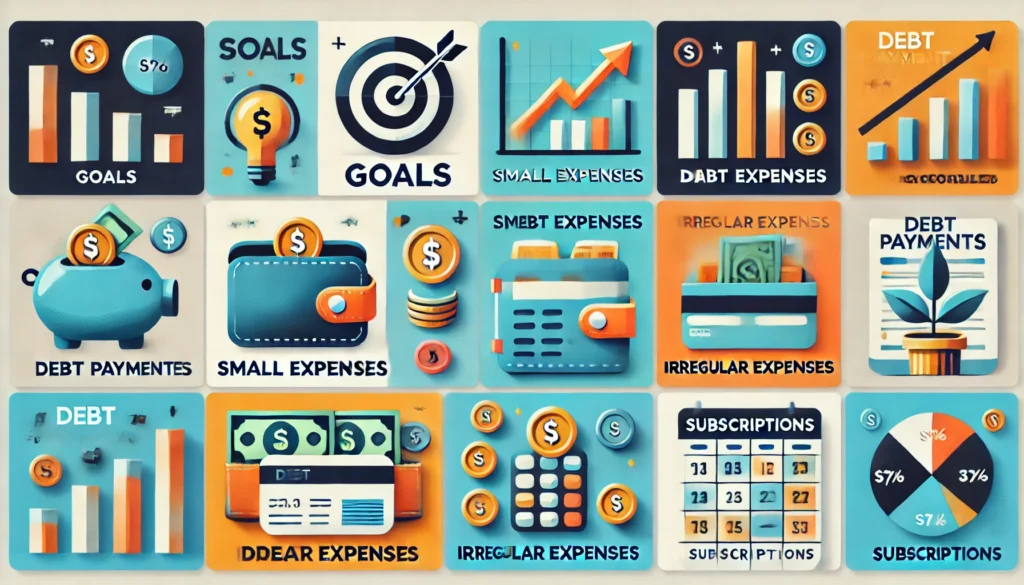10 Budgeting Mistakes to Avoid in the New Year
Earning more is not a secret of finance, but wisely spending money with planning is better.
The perfect time to take a serious look at our finances and work on budgets is the beginning of the New Year. Most of us plan to manage our finances better, but at the end of the year, we found several mistakes done by us over time. This year, make sure to avoid common budgeting mistakes to live a stress-free year with harmony.
Here are 10 mistakes which we should be careful and also we will explore how to keep it on track.

1. Set Realistic Goals for Budget
Dreaming Big and thinking excited about our plans is an easy task but unrealistic goals can put us into frustration & depression. To avoid failure to save a big large sum we should plan to set realistic goals that are achievable.
- TIP 1: Break down our big goal into small achievable parts to make it an easy path. For Example, Instead of saving $5000 in a year, we should start with $400 in a month and it will gradually increase.
- TIP 2: Always make goals specific and measurable at our end. “Save money for the emergency fund” is vague but giving it any number for example “Save $2000” for an emergency fund in 6 months is a clear target with vision.
2. Ignoring Small Expenses in the budget
Commonly, Most people ignore their small expenses, but they add up to quite a big amount. Daily coffee runs, movies, parties, impulse buys, and subscriptions can drain our budget with our realizing.
- TIP 1: Keep track of your spending using a budgeting app or notebook. This will help us spot those sneaky small expenses.
- TIP 2: Set a plan or limit for our nonessential expenses. For Example, keeping a fixed amount for coffee, and a number of movies in a month or week is budget-friendly, so it prevents overspending of money.
3. Failing To Plan For Emergencies
Life is like a sinusoidal graph, various time unexpected expenses come like medical expenses, car repairs, or a sudden job loss. without emergency funds, this situation can leave us scrambling when unexpected costs arise.
- TIP 1: Start building an emergency fund by saving a small percentage of our income each month, even if it’s just 10%.
- TIP 2: Always keep emergency funds in another or separate savings account to avoid impulse buying or spending all money in flow.
4. Not Accounting for Debt Payments
Most people accumulate a lot of debt through credit cards, student loans, or personal loans, and it’s easy to forget to budget for monthly debt payments. Missing payments can lead to an extra load on the pocket due to late fees and higher interest rates, making our financial situation stressful.
- Tip 1: Always pay off high-interest debts first on priority. Paying off credit cards with high interest will save us more in the long run.
- TIP 2: Use the auto payment option for debt or EMI so we never miss a due date. This will keep your credit score good and prevent extra fee charges or penalties.
5. Overlooking Annual and Irregular Expenses
Costs like car insurance or property taxes may only appear once or twice a year and we don’t account for these in our monthly budget but when the bills arrive it worsens the financial condition.
- TIP 1: Keep aside a small amount each month for annual or irregular expenses. For example, if our car insurance will be $600 in six months, save $100 each month.
- TIP 2: Make a list of all upcoming large payments and mark them on a calendar to notify in advance for preparation.
6. Being Too Rigid
Following a planned budget is important but being too strict can feel like a financial prison. If we cut out all small ignorable expenses may eventually give up on budgeting altogether.
- Tip 1: Keep our budget flexible with room. We can allow ourselves occasional treats without guilt, as long as we do not deviate from our main financial goals.
- Tip 2: Revisit our budget periodically to make changes if adjustments are possible. Life changes, and so should our budget.
7. Not Tracking Our Progress
If we ignore to track our financial progress, it’s easy to lose sight of how much we’ve accomplished or how far we still need to go. Tracking our spending and savings keeps us updated and motivated.
- Tip 1: Regularly review our budget to see if we’re on track with savings goals and expenses.
- Tip 2: Use apps or spreadsheets to track our progress. The numbers can help us stay accountable for the budget.
8. Not Reviewing Subscriptions
Today, there are multiple subscriptions and services we hardly use like OOT platforms, gym memberships, and club memberships. These monthly subscriptions can slowly drain our finances.
- Tip 1: Cancel those subscriptions and memberships which we no longer need. This includes apps, memberships, and services.
- Tip 2: Set a reminder to review our subscriptions every few months to ensure we’re only paying for what we truly use.
9. Overestimating Future Income
Let’s not set a budget on the assumption that there will be an expected bonus or raise which is not certain because this can cause us to spend more than we are able to handle if those extra funds do not materialize.
- Tip 1: Always budget based on our current income. Avoid including any income that’s uncertain or unpredictable.
- Tip 2: If we do receive a raise or bonus, consider saving a portion of it instead of spending it all.
10. Not Involving the Whole Family
Each time we talk about budgeting, we think that this is something that should be done by someone alone. However, when we are together in a household or as a family, it is necessary to involve everyone. Otherwise, through the absence of communication, budgeting may end up in misunderstanding or over-consuming.
- Tip 1: Sit down with our family or household members to discuss the budget and everyone’s role in sticking to it.
- Tip 2: Regularly update everyone on progress and changes to avoid surprises when it comes to finances.
As the new year beckons, let’s not forget that budgeting is not only about reducing spending rather, it is an active process aimed at ensuring that every dollar we have works for us. It is possible to avoid these common mistakes and through making small alterations, position ourselves for financial success. We need to pledge to ourselves that this new year we will be cautious about expenditure, put money aside for any emergencies, and remain adaptable. Let’s work towards making this the year we finally take charge of our money.
You can also share your own views in the comments or write us @hevensh05@gmail.com and we would be really glad to share information and views on our website.
